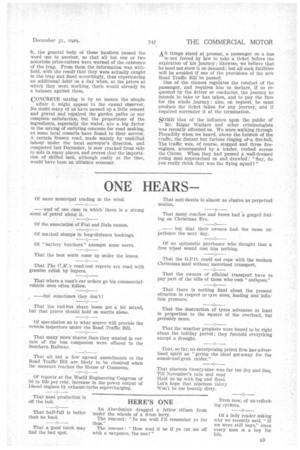W HILST we are chiefly concerned with transport by road, yet
Page 36

Page 37

If you've noticed an error in this article please click here to report it so we can fix it.
it is always interesting to note any reoaarkable products in other spheres, and this applies to the new London Midland and Scottish Railway engine, which has taken almost a year to build, and is about to go through its trials. It belongs to the Royal Scot class, but embodies the startling innovation of using a cylinder working at a steam pressure of 900 lb. per sq. in., the other two cylinders working at 250 lb. per sq. in. Actually, the engine has three boilers, each carrying a different pressure. In the first, it varies from 1,400 lb. to 1,800 lb. per sq. in. This feeds a second drum at 900 lb. per sq. in., whilst the third
boiler works at 250 lb. per sq. in. The steam exhausted from the h.p. cylinder is mixed with that from the L.P. boiler and used by the L.P. cylinders.
COACH proprietors certainly catered for those people who had to travel at Christmas time— especially on Christmas Eve and Boxing Day. One moderate-sized concern put on a schedule for Christmas Eve of no fewer than five coaches in each direction between London and Clacton.
AT the time when the ban was imposed upon the roadside sale of petrol at special terms to commercial users, there was a good deal of annoyance B2 expressed in many quarters. One of the few appreciations that we have heard has been from a concern handling fuel pumps. It appears that the sale of small-capacity pumps suitable for commercial garages has gone up by leaps and bounds since the ban came into force. Owners of small fleets find it cheaper to install a pump and storage tanks rather than to buy at full retail prices on the road.
EFFORTS are being made so to improve the general illumination of streets that even in C0111paratively outlying areas headlights will not be required on motor vehicles, thereby rendering driving at night far safer and avoiding the objectionable dazzle. Lewisham, for example, is engaged in an interesting series of experiments with both highpressure gas and electric lamps, a careful combination of lamps suspended over the roadway and others placed on the pavement giving a soft floodlight effect.
THE hauliers of Norfolk and Suffolk have their own ways of dealing with rate-cutters ; or, at least, they take whatever opportunities there are of getting their own back. It came to the knowledge of some of them recently that a police trap, was in Operation on a road habitually used during the beethaulage season. So soon as they became aware of It, the general body of these hauliers passed the word one to another, so that all but one or two notorions price-cutters were warned of the existence of the trap. From them the information was withheld, with the result that they were actually caught in the trap and fined accordingly, thus experiencing an additional debit on a day when, at the prices at which they were working, there would already be a balance against them.
CONCRETE mixing is by no means the simple affair it might appear to the casual observer. No doubt many of us have messed up a little cement and gravel and repaired the garden paths to our complete satisfaction, but the proportions of the ingredients, especially the water, are a big• factor in the mixing of enduring concrete for road making, as some local councils have found to their sorrow. A certain Sussex road, made mainly by unskilled labour under the local surveyor's direction, and completed last December, is now cracked from side to side in many places, and proves that the importation of skilled men, although costly at the time, would have been an ultimate economy. AS things stand at present, a passenger on a bus is'-not forced by law to take a ticket before the expiration of his journey ; likewise, we believe that he need not show it on demand ; but all such futilities will be avoided if one of the provisions of the new Road Traffic Bill be passed.
One of the clauses regulates the conduct of the passenger, and requires him to declare, if so requested by the driver or conductor, the journey he intends to take or has taken, and to pay the fare for the whole journey; also, on request, he must produce the ticket taken for any journey, and if required surrender it at the termination.
SOME idea of the influence upon the public of Mr. Edgar Wallace and other criminologists was recently afforded us. We were walking through Piccadilly when we heard, above the hubbub of the traffic, the distant but furious ringing of.a. fire-bell. The traffic was, of course, stopped and three fireengines, accompanied by a tender, rushed across the Circus. When they had passed a well-dressed young man approached us and drawled : "Say, do you really think that was the flying squad?"




































































































